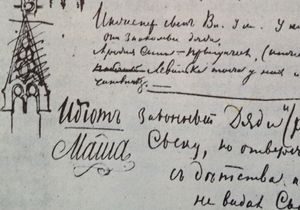Olga Umetskaya

The Trial of Olga Umetskaya
In August 1867, Dostoevsky was in Geneva and had begun work on the novel that would eventually become The Idiot (Mochulsky 334). As an avid reader himself, Dostoevsky maintained his ties to Russia by keeping up with news through the newspapers that were available in Geneva (Catteau 180). It was there that he first read of the trial of Olga Umetskaya, which took place in the Russian province of Tula and was first heard in September 1867 (Mochulsky 335).
Olga Umetskaya was a fourteen-year-old girl who attempted to burn down her parents’ estate on four separate occasions, and tried to commit suicide after the last attempt and before her arrest (Frank 246). Over the course of the trial, the testimony demonstrated that Olga and her siblings were regularly beaten and horrendously mistreated by their parents (Catteau 181). Olga’s two little brothers had been so grossly mistreated and were beaten so severely that they were unable to speak at 7 years old (Catteau 181). Dostoevsky wrote of his fascination with the Umetskaya case, and his wife, Anna Grigoryevna, had also noted his interest in Umetskaya’s trial (Frank 246; Mochulsky 245).
Olga Umetskaya was acquitted for her crimes and received no sentencing (Frank 246). Umetskaya’s parents received a very minimal sentencing, which was greatly distressing for Dostoevsky. He interpreted the failures of the Olga Umetskaya case as indicative of flaws in the court system, as well as the education and the moral principles of the judges (Frank 246).
Olga Umetskaya in Dostoevsky's Works
Dostoevsky was fascinated by the trial, and had intended to use its basis as a background for a character in The Idiot (Frank 246). Dostoevsky was interested in conveying the suffering of children, and the way that the new court system had handled the public suffering of Olga Umetskaya (Rosenshield 36). Olga Umetskaya’s name does not appear directly in The Idiot but was written by Dostoevsky in the margins of a list that detailed Dostoevsky’s planned literary projects (Frank 246). The name Olga Umetskaya was connected with the name of another character, “Mignon” (Catteau 182). Dostoevsky’s use of the name “Mignon” is likely a reference to Goethe’s character of the same name, likely due to Olga Umetskaya’s description as a soft-spoken blonde with childlike characteristics and blue eyes (Mochulsky 335)
Although Dostoevsky’s earlier drafts of The Idiot detailed a character named Mignon, she doesn’t appear in the final version of the novel (Frank 247). Mignon was to be a character that would accentuate the flaws in the Russian upper class, and the novel would revolve around her family and their interactions with the character of the Idiot (Mochulsky 336). Mignon’s backstory mirrored Olga Umetskaya’s abuse by her parents and subsequent attempts to burn own their estate. His notes showed that his earlier plan for Mignon was that she would be violated by the character of the Idiot but would subsequently forgive him out of her need to exert her own prideful nature (Lord 31). This version of the “Olga Umetskaya” character was prototypical of the character Nastasya Fillipovna that appears the final version of the novel (Rosenshield 36).
References
Rosenshield, Gary. Western law, Russian justice Dostoevsky, the jury trial, and the law. Madison, WI: U of Wisconsin Press, 2005. Print.
Frank, Joseph. Dostoevsky: The Miraculous Years, 1865-1871. Vol. 4. New Jersey: Princeton U Press, 1995. Print.
Lord, R. "A Reconsideration of Dostoyevsky's Novel, "The Idiot"." The Slavonic and East European Review 45.104 (1967): 30-45. Web. 27 Mar. 2017.
Mochulsky, Konstantin. Dostoevsky ; his life and work: Translated and introduction by Michael A. Minihan. New jersey: Princeton U Press, 1967. Print.
Mochulsky, Konstantin. Dostoyevsky and the Process of Literary Creation. Cambridge: Cambridge U Press, 1989. Print.